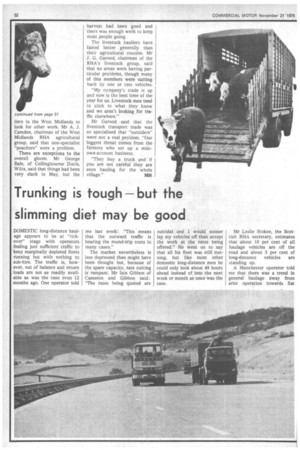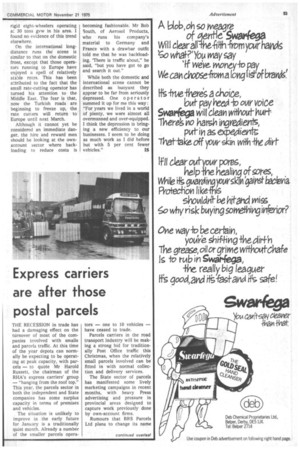Trunking is tough but the slimming diet may be good
Page 58

Page 59

If you've noticed an error in this article please click here to report it so we can fix it.
DOMESTIC long-distance haulage appears to be at "tickover" stage with operators finding just sufficient traffic to keep marginally depleted fleets running but with nothing to sub-hire. The traffic is, however, out of balance and return loads are not as readily available as was the case even 12 months ago. One operator told me last week: "This means that the outward traffic is bearing the round-trip costs in many cases."
The market nevertheless is less depressed than might have been thought but, because of the spare capacity, rate cutting is rampant. Mr lain Gibbon of Cameron and Gibbon said: "The rates being quoted are suicidal and I would sooner lay my vehicles off than accept the work at the rates being offered." He went on to say that all his fleet was still running, but like most other domestic long-distance men he could only look about 48 hours ahead instead of into the next week or month as once was the case. Mr Leslie Stokoe, the Scottish RHA secretary, estimates that about 10 per cent of all haulage vehicles are off the road and about 3 per cent of long-distance vehicles are standing up.
A Manchester operator told me that there was a trend in general haulage away from artic operation towards flat rigid eight-wheelers operating at. 30 tons gvw in his area. I found no evidence of this trend elsewhere.
On the international longdistance runs the scene is similar to that on the domestic front, except that those operators running to Europe have enjoyed a spell of relatively stable rates. This has been attributed to the fact that the small rate-cutting operator has turned his attention to the Middle East. The fear is that, now the Turkish roads are beginning to freeze up, the rate cutters will return to Europe until next March.
Although it cannot yet be considered an immediate danger, the hire and reward men should be looking at the ownaccount sector where backloading to reduce costs is becoming fashionable. Mr Bob South, of Aerosol Products, who runs his company's material to Germany and France with a drawbar outfit told me that he was backloading, 'There is traffic about," he said, "but you have got to go and search it out."
While both the domestic and international scene cannot be described as buoyant they appear to be far from seriously depressed. One operator summed it up for me this way : "For years we lived in a world of plenty, we were almost all overmanned and over-equipped. I think the depression is bringing a new efficiency to our businesses. I seem to be doing as much work as I did before but with 5 per cent fewer vehicles." IS








































































































